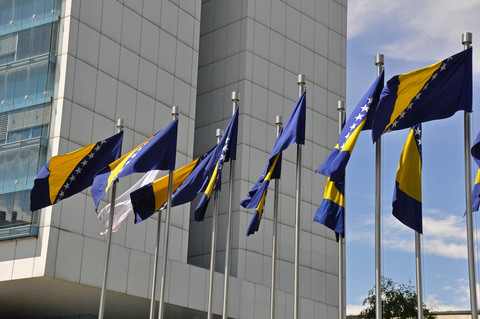[ad_1]

In its quest for a quick deliverable in Bosnia and Herzegovina, the European Union is trying to broker a deal that risks entrenching the power of Croat nationalists who are resisting moves to make the country more functional.
There is a growing understanding that the country’s constitution, part of the 1995 Dayton peace accords that ended the bloodiest conflict in Europe after World War II, needs changes in order for Bosnia to properly function.
Constitutional reform is also an explicitly-stated requirement for the opening of membership talks with the EU.
In its 2019 opinion on Bosnia’s membership application, the European Commission enumerated 14 priorities to be addressed before accession talks may begin.
They include constitutional reform to reduce ethnicity-based decision-making, in a bid to make the central government more functional and accountable.
But the EU is now engaging in negotiations on changes to the country’s election law without touching the constitution, hoping this would make a deal easier to reach and placate ethnic Croat and Serb hardliners who oppose any strengthening of the central government.
EU ambassador Johann Sattler has been in talks with nationalist parties to change the country’s election law, as required by court rulings and the EU’s own conditions, without amending the constitutional framework which contains discriminatory provisions about ethnic representation.
The deal proposed by the Croat side that forms the basis of the negotiations would in effect create a third entity through the back door, in addition to the existing two – a long-standing demand by Croat hardliners, who argue that while Serbs have their own entity – Republika Srpska – they have to share power with Bosniaks in the other entity, the Bosniak-Croat Federation.
Stranglehold cemented
The move would cement the stranglehold of the incumbent HDZ, sister party to the ruling party in neighbouring Croatia, an EU member state that has been lobbying hard for the changes.
But the deal taking shape in the negotiations led by Sattler would not empower the Bosnian Croat people – it would render the HDZ’s power near unbreakable.
It would replicate a deal brokered by the EU, the US, and the UK between the HDZ and its Bosniak counterpart, the SDA, in the town of Mostar, excluding all other parties.
That deal made it possible for local elections to take place in December for the first time in a dozen years – but at the cost of formalising the ethno-territorial division of the town and entrenching the HDZ and the SDA.
A written commitment to election law changes, based on the HDZ BiH’s core notion of “proportionate ethnic political representation,” formed the third, integral part of the deal package.
After half a year in which the EU insisted having nothing to do with that document, Sattler and the commission have now accepted it as the basis for negotiations.
The philosophy behind the latest round of negotiations is that any deal the local power-brokers can agree is a good deal.
This is the same transactional approach that informed high representative Federica Mogherini’s support for a land-swap between Kosovo and Serbia, which would have had a major destabilising impact on the entire region but in particular on Bosnia, by emboldening Bosnian Serbs and their separatist agenda.
The main Bosnian Serb party, led by Bosnian presidency member Milorad Dodik, is closely allied with the HDZ in resisting anything that would make the common state more functional and accountable.
Dodik and HDZ leader Dragan Covic are threatening to block a general election scheduled for next year if their demands aren’t met.
The EU, with the support of a US state department that is largely on autopilot following four traumatic years under the Trump administration, is now pursuing a deal that would ostensibly meet earlier rulings by the European Court of Human Rights, notably in the landmark Sejdić-Finci judgment.
Covic has used these rulings for years to push, together with his sponsors in Zagreb, for changes that would ensure that only an HDZ candidate – such as Covic himself – can be elected to the Croat seat on the three-member Presidency.
(Under the Dayton constitution, anyone voting in the federation can endorse any candidate for the Croat or Bosniak seat on the presidency, allowing Bosniaks to outvote Croats and help elect a Croat presidency member.)
The very fact that the EU is ready to negotiate on so-called electoral reforms with the HDZ and SDA, two parties that have consistently demonstrated genuine rejection to implement Sejdić-Finci or make the electoral process more transparent and democratic, demonstrates Brussels’ readiness to give Čović’ third entity project if not an outright free pass, then at least to compromise on it.
The EU, together with the broader international community, is once again trying to apply a band-aid to a gaping wound, while inflicting new injury and undercutting transparency and liberal democratic values.
The Commission’s opinion of 2019 provided a succinct, and accurate, diagnosis of this festering sore – the veto power of ethno-nationalist parties that are completely unaccountable to their constituents, and who rule through fear and patronage (bankrolled by EU taxpayers).
It is all the more troubling that the EU’s highest official in the country is exacerbating an injury which requires deeper and more robust intervention in order to heal.
[ad_2]
Source link